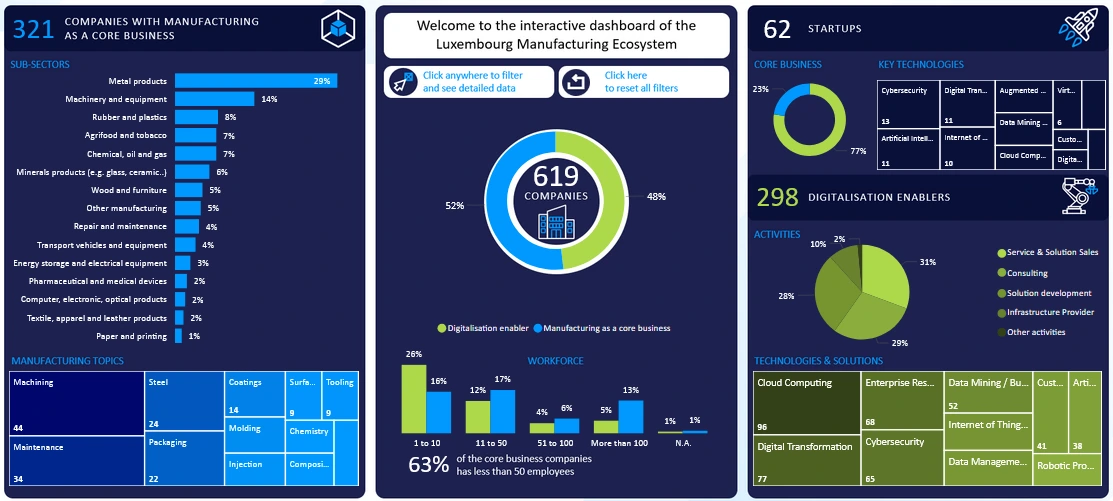


A two-day conference organised by the Luxembourg Chamber of Deputies and the FNR reviewed major societal and economic trends that will shape the future. Luxinnovation’s CEO Sasha Baillie was one of the speakers identifying challenges and opportunities that Luxembourg is likely to face in the coming years.
 Jean-Michel Gaudron
Jean-Michel Gaudron
At the initiative of the Chamber of Deputies and the National Research Fund (FNR), the Cercle-Cité in Luxembourg hosted the event "Megatrends 2050: Designing the future through scientific foresight".
The two-day conference brought together researchers, political and economic decision-makers with a focus on the future and how to approach it.
"The concept of 'megatrends' originated in the world of insurance and auditing and has gradually spread to the sphere of political decision-making. It rubs shoulders with the more classic methods of geostrategic forecasting", explains Fernand Etgen, President of the Luxembourg Chamber of Deputies.
This is precisely the exercise that the country is currently undertaking with the work of the Ministry of the Economy and its strategic foresight department "Luxembourg Stratégie".
"Research, dialogue and the exchange of ideas will certainly allow us to identify today what can serve us tomorrow," he explains.
The conference marked the end of the third edition of the programme "Pairing Scheme - Politics meets Research" developed by the National Research Fund (FNR) in order to bring MPs and researchers closer together. "We want to develop a better mutual understanding of their respective activities and efforts," explains Marc Schiltz, the FNR's secretary general.
"Scientists and politicians have complementary roles to play in society. But in the end, it is up to the latter to make the decisions. We believe that the best decisions are those based on state-of-the-art data and knowledge. That's where researchers can provide important advice in their areas of expertise," he says.
Cat Tully, co-founder and director of the School of International Futures, pointed out that the greatest danger in turbulent times is not the turbulence itself. It's trying to act with yesterday's logic. "The signals exist! They are all around us. That's what we call megatrends. The problem is not to detect them, but to act appropriately and to know how to integrate them into decision-making."
Whatever the definitions of these megatrends, they generally all revolve around the major societal issues of climate change, resources and the environment, demographics, or technology and its governance.
"Behind all these megatrends, there are alternative scenarios," Ms Tully assures. "It's up to everyone to shape that future. To do this, there are two possible approaches: either we add decisions one after the other, or we proceed to a real transformation. And to transform, it is imperative to take into account three fundamental ingredients: the technocratic agenda in institutions, the democratisation of debates on the future by involving citizens more and the support of decision-makers in making decisions that are right for current, but also future generations."
All these megatrends have one thing in common: they have, and will have, a global impact, and more specifically on the economy and business. In this context, the role of an innovation agency such as Luxinnovation is to anticipate these trends, to identify those that impact the country the most, and then to support the implementation of innovative projects in response to these megatrends. The objective is to prepare the economy and businesses for tomorrow's world in the best way possible.
"The changes ahead can be a source of fear and apprehension for any entrepreneur or business leader," explained Sasha Baillie, Luxinnovation's CEO. "We are convinced that innovation is fundamental for providing part of the solutions to the problems encountered. It makes it possible to implement new practices, and in particular to adapt the way companies and the economy operate in the face of all these changes."
At the end of 2022, the European Commission's Megatrends Hub platform identified no less than 14 megatrends crucial to Europe's future.
"By megatrends, we mean structural forces of change that will have strong social, economic and political impacts in the future," explains Sara Bouchon, Director Market Intelligence at Luxinnovation. These processes are often irreversible and take time. The challenge is to identify those that will be truly relevant for our future.
During the event "Megatrends 2050: Designing the future through scientific foresight", Ms Baillie mentioned three of these megatrends that Luxembourg is addressing by implementing structuring projects benefiting the entire economy, and by supporting companies in their own innovative projects:
"Recognising and anticipating the challenges and opportunities of these megatrends is a key element for businesses and the economy to create the digital, competitive and sustainable economy of tomorrow," said Ms Baillie.
And to quote Steve Jobs, "innovation is the ability to see change as an opportunity rather than a threat."